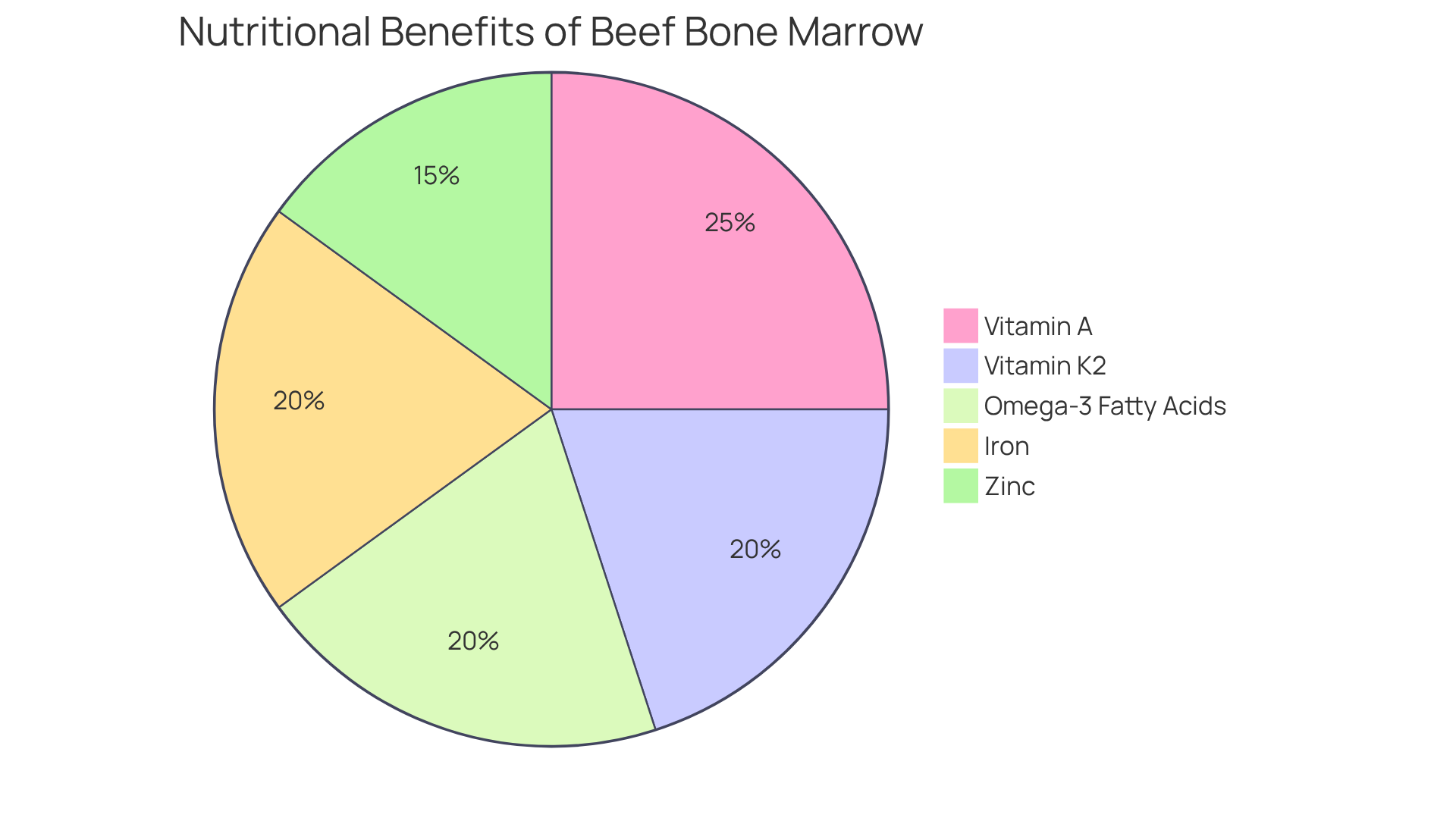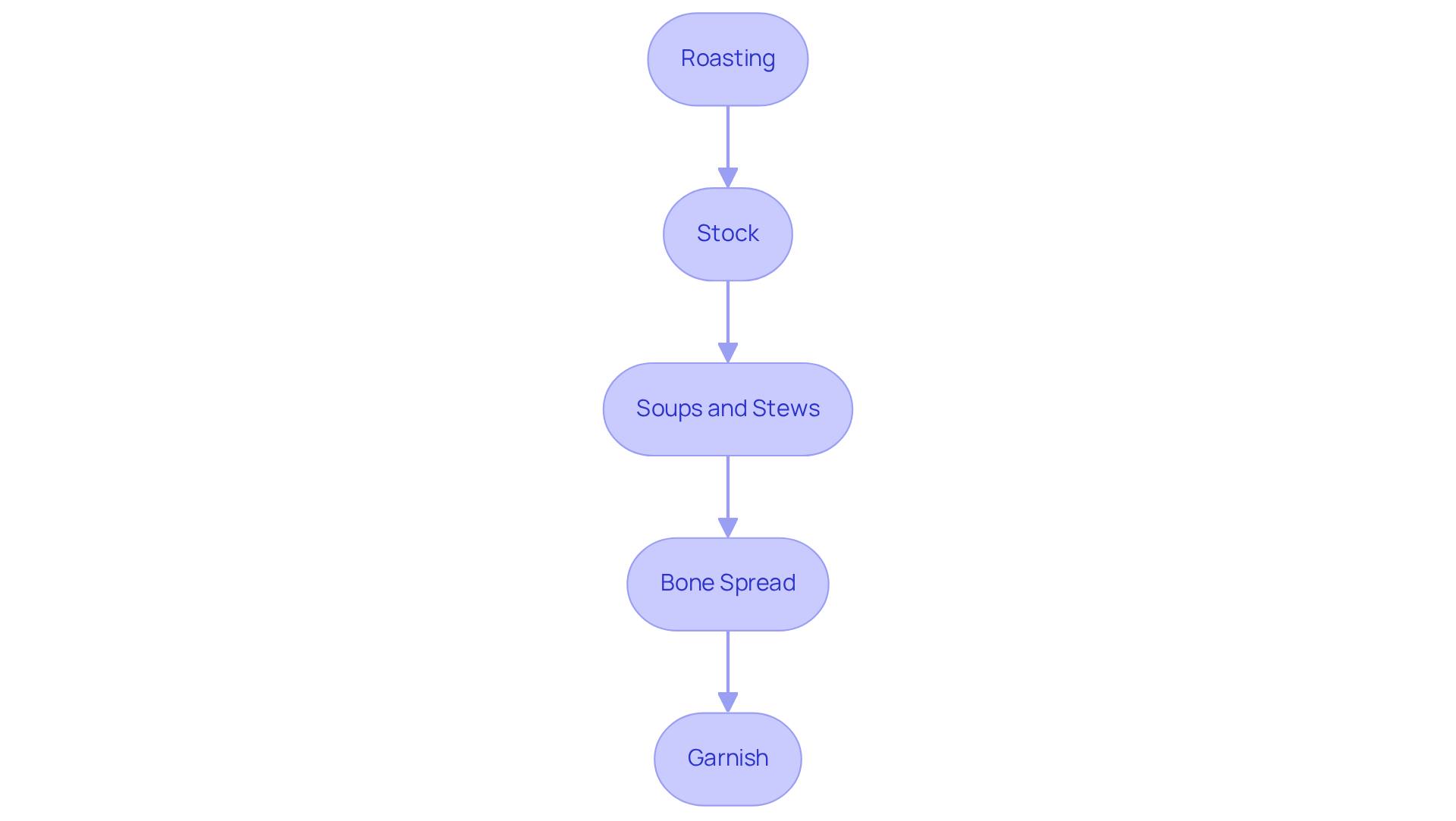Is Beef Bone Marrow Good for You? Discover Its Benefits and Uses
Overview
Beef bone marrow is nutrient-rich and beneficial for your health. It provides essential compounds such as:
- Collagen
- Glucosamine
- Vitamins A and K2
- Omega-3 fatty acids
These nutrients support skin health, joint function, and immune response. However, while the benefits are significant, it is crucial to consume it in moderation and ensure quality sourcing. This approach maximizes the advantages while minimizing potential health risks. By understanding these factors, you can make informed choices about incorporating beef bone marrow into your diet.
Introduction
Exploring the world of nutrition often leads to intriguing questions about the foods we consume. Beef bone marrow stands out as a nutrient powerhouse. Packed with collagen, vitamins, and essential fatty acids, this often-overlooked ingredient supports joint and skin health. Moreover, it aligns with modern dietary trends focused on longevity and wellness. However, with its rich profile comes the need for careful consideration. What are the potential risks and best practices for incorporating this delicacy into a balanced diet?
Understand the Nutritional Benefits of Beef Bone Marrow
Exploring the benefits of quality nutrition raises the question: is beef bone marrow good for you, considering it is a nutrient-rich food that offers a variety of advantages, particularly for those looking into anti-aging strategies? It is rich in collagen, which plays a vital role in maintaining the health and elasticity of skin and connective tissues. This makes it a valuable addition to a carnivore diet that focuses on animal-based foods for longevity. Furthermore, the substance within skeletal tissue contains glucosamine, a compound known for its role in promoting joint health and reducing inflammation, which is especially important as we age.
Other essential nutrients found in bone marrow include:
- Vitamin A: Supports vision and immune function.
- Vitamin K2: Essential for skeletal health and cardiovascular wellness.
- Omega-3 Fatty Acids: Help reduce inflammation and support cardiovascular health.
- Iron and Zinc: Crucial for red blood cell production and immune function.
Many people wonder if beef bone marrow is good for you, as incorporating cattle connective tissue into your diet can enhance overall health, particularly as you age, by supporting joint function, skin health, and immune system response. This aligns with insights from ByKomi.com regarding the significance of quality nutrition and innovative therapies in promoting longevity.

Explore Ways to Add Beef Bone Marrow to Your Meals
Incorporating beef cartilage into your meals can be done through various methods that enhance both flavor and nutrition. Here are some popular techniques to consider:
- Roasting: Preheat your oven to 450°F (232°C). Position the bone pieces upright on a baking sheet, drizzle with olive oil, and season with salt and pepper. Roast for approximately 15-20 minutes until the center is tender and begins to detach from the structure. This dish pairs wonderfully with toasted bread for dipping.
- Stock: Utilize skeletal parts to create a rich stock. Simmer the remnants in water with vegetables and herbs for several hours to extract their nutrients. This flavorful broth can serve as a base for soups, stews, or can be enjoyed on its own.
- Soups and Stews: Enhance your favorite soups or stews by adding bone pieces. The substance will dissolve into the dish, enriching the flavor and overall nutritional profile.
- Bone Spread: Blend roasted bones with herbs and spices to craft a flavorful bone spread. This spread can be applied to bread or used to elevate the taste of meats and vegetables.
- Garnish: Use bone tissue as a garnish for steaks or other meats. Simply scoop out the filling and place it atop the cooked meat for added richness.
By experimenting with these techniques, you can savor the distinctive taste and nutritional advantages of animal extracts, as well as explore whether beef bone marrow is good for you in various dishes. Why not try one of these methods in your next meal?

Consider Health Precautions When Consuming Beef Bone Marrow
While beef bone marrow offers numerous health benefits, it is essential to consider certain precautions:
- Moderation: Due to its high fat and calorie content, approximately 200 calories per tablespoon, it is advisable to consume bone marrow in moderation. Aim for 1-2 servings per week to avoid excessive calorie intake.
- Quality of Source: Select premium, grass-fed beef joints to guarantee you are consuming the healthiest option. Grass-fed sources are typically richer in omega-3 fatty acids and lower in harmful additives.
- Allergies and Sensitivities: Be aware of any food allergies or sensitivities, particularly to red meat. If you have a history of allergies, consult with a healthcare professional before incorporating animal tissue into your diet.
- Cooking Temperature: Ensure that the center of the bones is cooked to a safe internal temperature of at least 145°F (63°C) to reduce the risk of foodborne illness.
- Consultation with Medical Professionals: If you have underlying medical conditions, such as high cholesterol or heart disease, consult with a medical professional before adding this tissue into your diet.
As Hippocrates famously stated, “Let food be thy medicine and medicine be thy food.” By adhering to these precautions, you can safely enjoy the nutritional benefits of beef bone marrow while determining if beef bone marrow is good for you and minimizing potential risks. Additionally, it’s important to consider the implications of high-fat diets, as they can affect overall health and should be approached with care.

Conclusion
Beef bone marrow is a nutrient-dense food that offers a myriad of health benefits, particularly for those seeking to enhance their diet with collagen-rich and anti-inflammatory ingredients. Its high content of essential vitamins and minerals, including vitamin A, vitamin K2, omega-3 fatty acids, iron, and zinc, positions it as a valuable addition to meals aimed at promoting joint health, skin vitality, and overall well-being.
The article delves into various ways to incorporate beef bone marrow into everyday cooking. Methods such as:
- Roasting
- Creating rich stocks
- Crafting flavorful spreads
are highlighted. Furthermore, it emphasizes the importance of moderation and sourcing high-quality, grass-fed beef to maximize health benefits while minimizing potential risks associated with high-fat content. Additionally, awareness of allergies and cooking safety is crucial for enjoying this delicacy without adverse effects.
Ultimately, embracing the nutritional advantages of beef bone marrow can be a rewarding endeavor for those looking to enhance their culinary repertoire and health. By experimenting with different preparation techniques and being mindful of consumption guidelines, individuals can fully appreciate the richness of this food while reaping its benefits. Exploring the health benefits of beef bone marrow not only contributes to personal wellness but also encourages a deeper connection with nutrition as a vital component of a healthy lifestyle.
Frequently Asked Questions
What are the nutritional benefits of beef bone marrow?
Beef bone marrow is rich in collagen, which helps maintain the health and elasticity of skin and connective tissues. It also contains glucosamine, which promotes joint health and reduces inflammation.
What specific vitamins and nutrients are found in beef bone marrow?
Beef bone marrow contains several essential nutrients, including Vitamin A (supports vision and immune function), Vitamin K2 (important for skeletal health and cardiovascular wellness), Omega-3 fatty acids (reduce inflammation and support cardiovascular health), as well as Iron and Zinc (crucial for red blood cell production and immune function).
How does beef bone marrow contribute to anti-aging strategies?
Beef bone marrow supports overall health, particularly as we age, by enhancing joint function, skin health, and immune system response, making it a valuable addition to a carnivore diet focused on longevity.
Is beef bone marrow suitable for a carnivore diet?
Yes, beef bone marrow is a valuable addition to a carnivore diet, as it focuses on animal-based foods that can contribute to health and longevity.
Why is glucosamine important in beef bone marrow?
Glucosamine is important because it promotes joint health and helps reduce inflammation, which is particularly beneficial as individuals age.




